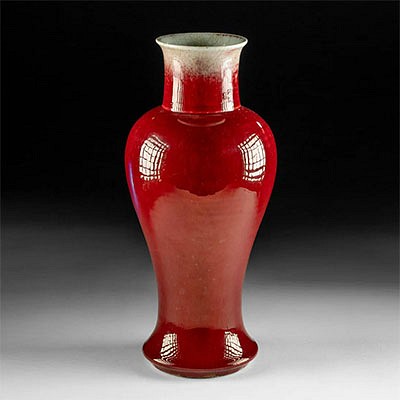20th C. Polynesian Tongan Rubbing Stamp / Kupesi
Lot 301
About Seller
Artemis Fine Arts
686 S Taylor Ave, Ste 106
Louisville, CO 80027
United States
Selling antiquities, ancient and ethnographic art online since 1993, Artemis Gallery specializes in Classical Antiquities (Egyptian, Greek, Roman, Near Eastern), Asian, Pre-Columbian, African / Tribal / Oceanographic art. Our extensive inventory includes pottery, stone, metal, wood, glass and textil...Read more
Estimate:
$1,200 - $1,800
Absentee vs Live bid
Two ways to bid:
- Leave a max absentee bid and the platform will bid on your behalf up to your maximum bid during the live auction.
- Bid live during the auction and your bids will be submitted real-time to the auctioneer.
Bid Increments
| Price | Bid Increment |
|---|---|
| $0 | $25 |
| $300 | $50 |
| $1,000 | $100 |
| $2,000 | $250 |
| $5,000 | $500 |
| $10,000 | $1,000 |
| $20,000 | $2,500 |
| $50,000 | $5,000 |
| $100,000 | $10,000 |
| $200,000 | $20,000 |
About Auction
By Artemis Fine Arts
May 11, 2023
Set Reminder
2023-05-11 10:00:00
2023-05-11 10:00:00
America/New_York
Bidsquare
Bidsquare : Fine Antiquities, Asian, Pre-Columbian, Ethnographic Art
https://www.bidsquare.com/auctions/artemis-gallery/fine-antiquities-asian-pre-columbian-ethnographic-art-12771
Classical antiquities, ancient and ethnographic art from cultures encompassing the globe. Artemis Fine Arts info@artemisfinearts.com
Classical antiquities, ancient and ethnographic art from cultures encompassing the globe. Artemis Fine Arts info@artemisfinearts.com
- Lot Description
**Originally Listed At $800**
Oceania, Polynesia, Tonga, ca. 20th century CE. A rare example of a rubbing stamp known as a kupesi, used as a template for creating patterns on traditional tapa backcloth. The kupesi is constructed from a square of pandanus or coconut sheath, that is then laminated to a tapa cloth back, the stamp face has raised twigs (coconut midribs) wrapped in thin coconut fiber strands, the twigs are then sewn to the mat. The coiled coconut around the twigs adds texture and contrast when the ink is applied. To make patterns with a kupesi, this template is placed under the cloth, ink is applied on top of the tapa cloth and rubbed into the fibers. To just make the stencil must have been a painstaking process, not to mention the work that went into processing the tapa cloth that the back plate is covered in, and the tapa textile the stamp would have been used on! Size: 12" L x 11" W (30.5 cm x 27.9 cm)
According to the curatorial staff at Harvard University's Peabody Museum: "For hundreds of years, tapa making was one of the most sophisticated plant-fiber technologies in the Pacific Islands. In the eighteenth century and before, tapa served as both daily and ceremonial clothing. It was made into headdresses, turbans, loincloths, sashes, girdles, skirts, and ponchos. The cloth was used for bedcovers, wall dividers, or mosquito curtains as well as for special wrappings of staff gods, for the outer layer of sculptures, for wrapping skulls, and for masks. Individuals were surrounded by tapa at birth, weddings, and death. Special cloths were made for dowries, diplomatic gifts, and treaty agreements. Large-scale accumulation of tapa signified wealth and aided in achieving status. It was also used to pay tribute. Barkcloth material, partially processed or as undecorated sheets, was an important trade item and was exchanged for plaited mats, adzes, whale teeth, and sandalwood. Eventually, the increased availability of woven cotton cloth made in Asia and Europe led to a significant decline of hand-produced tapa, altered its use, and encouraged further changes in the ways in which tapa was decorated."
Provenance: private Newport Beach, California, USA collection
All items legal to buy/sell under U.S. Statute covering cultural patrimony Code 2600, CHAPTER 14, and are guaranteed to be as described or your money back.
A Certificate of Authenticity will accompany all winning bids.
We ship worldwide and handle all shipping in-house for your convenience.
#160980Some fraying and loosening to coiled coconut fiber strands. Overall great condition and a rare tool.Condition
- Shipping Info
-
All shipping is handled in-house for your convenience. Your invoice from Artemis Gallery will include shipping calculation instructions. If in doubt, please inquire BEFORE bidding for estimated shipping costs for individual items. In most cases Artemis Gallery cannot ship to Australia and Germany, please inquire before bidding.
-
- Buyer's Premium



 EUR
EUR CAD
CAD AUD
AUD GBP
GBP MXN
MXN HKD
HKD CNY
CNY MYR
MYR SEK
SEK SGD
SGD CHF
CHF THB
THB













